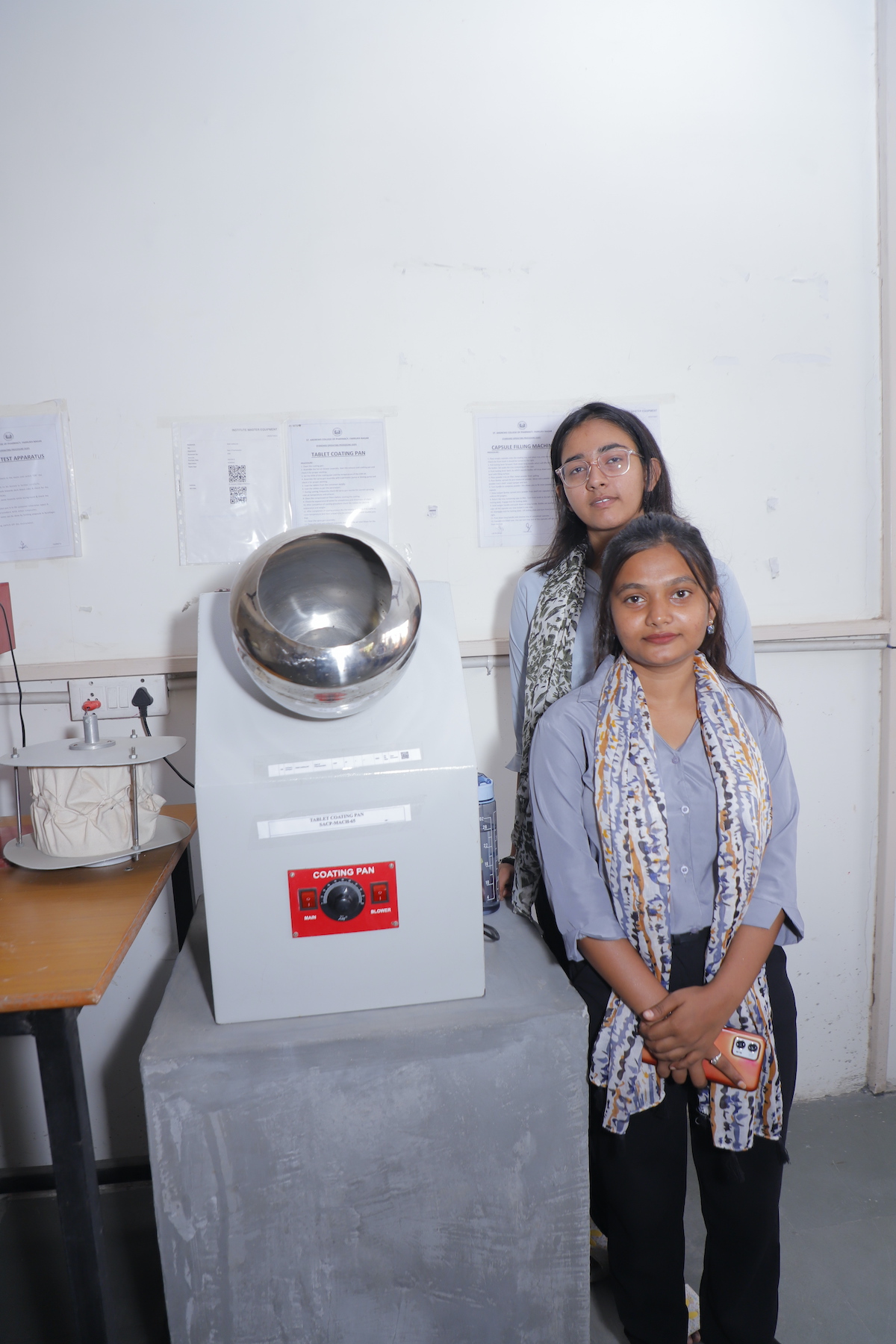D Pharma Syllabus
The D.Pharma syllabus is designed to provide foundational knowledge in pharmaceutical sciences. It typically spans two years and includes subjects like Pharmacology, Pharmaceutics, Pharmaceutical Chemistry, Pharmacognosy, and Hospital & Clinical Pharmacy.
The curriculum covers the basics of drug formulation, action, and dispensing, along with practical training in pharmacy practice. Students also learn about human anatomy, physiology, and health education.
The D Pharma syllabus focuses on developing essential skills for both community and hospital pharmacy settings, ensuring graduates are well-prepared to assist in patient care and contribute effectively to the healthcare industry.
Some of the most opted courses in India and St. Andrews college or different Engineering college or Management colleges are as follows:-
- Btech
- Btech CSE
- Btech ETCE
- MTech
- BCA
- BBA
- MBA
- MCA
- DPharma – St. Andrews College of Pharmacy
- BPharma – St. Andrews College of Pharmacy
- BArch – St. Andrews College of Architecture
Overview of D Pharma Course

The Diploma in Pharmacy (D. Pharma) is an undergraduate course in pharmacy designed to prepare students for entry-level roles in the pharmaceutical industry. The D Pharma syllabus equips students with the knowledge and skills required to work as pharmacists in hospitals, community pharmacies, and other related sectors.
Here’s an overview of the D. Pharma course:
Duration:
- 2 years of academic study, divided into 4 semesters.
- 6 months of internship/practical training is usually required after completing the academic study.
Eligibility:
- Candidates must have completed higher secondary education or an equivalent examination from a recognized board with subjects in Physics, Chemistry, and Biology/Mathematics.
- A minimum aggregate score of 50% in the qualifying examination is typically required, though this may vary by institution.
Curriculum:
The D. Pharma course includes both theoretical and practical subjects related to the pharmacy field. Some of the key subjects include:
- Pharmaceutics: Study of drug formulations, manufacturing, and dispensing.
- Pharmaceutical Chemistry: Involves the study of chemical aspects of drug molecules.
- Pharmacology: Focuses on the effects of drugs on the human body.
- Pharmacognosy: Study of medicinal properties of natural products and plants.
- Hospital and Clinical Pharmacy: Understanding the role of pharmacists in healthcare settings.
- Biochemistry & Clinical Pathology: Basic concepts of biochemistry and their application in pathology.
- Human Anatomy & Physiology: Study of human body structure and functions.
- Health Education & Community Pharmacy: Basics of public health and the role of pharmacy in community health.
Career Opportunities:
Upon completion of the D. Pharma course, graduates can pursue various roles in the pharmaceutical and healthcare sectors, including:
- Pharmacist in hospitals, community pharmacies, or retail drug stores.
- Medical Representative in pharmaceutical companies.
- Pharmacy Technician in hospitals and healthcare settings.
- Entrepreneur (opening a pharmacy or medical store).
- Sales and Marketing roles in pharmaceutical industries.
Higher Education:
- Bachelor of Pharmacy (B. Pharma): Students can further their studies by enrolling in a B. Pharma program, usually in the second year through lateral entry.
- Specialization: Post-graduation courses like Master of Pharmacy (M. Pharma) or MBA in Pharmaceutical Management are options for those interested in higher studies.
D Pharma Curriculum and Syllabus

The D. Pharma curriculum and syllabus are designed to provide students with a comprehensive understanding of the pharmaceutical science, including the theoretical and practical aspects of drug formulation, pharmacology, and healthcare. The course is typically divided into two academic years, each containing a set of subjects that cover various aspects of pharmacy.
Here’s a semester-wise breakdown of the D. Pharma curriculum and syllabus:
First Year
Semester 1:
Pharmaceutics I : History of Pharmacy, Dosage Forms, Metrology, Packaging of Pharmaceuticals, Size Reduction and Separation, Mixing and Homogenization, Clarification and Filtration, Extraction and Galenicals, Heat Processes (Drying, Sterilization), Surgical Aids
Pharmaceutical Chemistry I (Inorganic Chemistry): Inorganic Chemistry Basics, Volumetric Analysis, Identification Tests for Inorganic Compounds, Purity Tests for Inorganic Compounds, Qualitative Analysis of Inorganic Compounds
Biochemistry & Clinical Pathology: Introduction to Biochemistry
Carbohydrates: Structure, Function, and Metabolism
Lipids: Structure, Function, and Metabolism
Proteins: Structure, Function, and Metabolism
Enzymes: Types, Mechanisms, and Functions
Vitamins: Types, Sources, and Deficiencies
Pathophysiology of Common Diseases
Human Anatomy & Physiology: Introduction to Human Body Structure, Cells and Tissues, Skeletal System, Muscular System, Nervous System, Cardiovascular System, Digestive System
Health Education and Community Pharmacy: Concepts of Health and Disease, Nutrition and Health, First Aid and Emergency Treatment, Preventive Healthcare, Epidemiology of Common Diseases
Semester 2:
Pharmaceutics II: Dispensing Pharmacy, Prescription Handling, Posology (Doses of Drugs), Incompatibilities in Prescriptions, Pharmaceutical Calculations, Advanced Dosage Forms, Dispensing of Medications
Pharmaceutical Chemistry II (Organic Chemistry): Introduction to Organic Chemistry, Structure and Properties of Organic Compounds, Stereochemistry, Reactions of Organic Compounds, Medicinal Chemistry Introduction, Synthesis and Drug Design
Pharmacognosy: Introduction to Pharmacognosy, Study of Glycosides, Alkaloids, Tannins, Volatile Oils, Resins, Herbal Drugs: Sources, Classification, and Identification, Natural Drugs Used in Traditional Medicine, Adulteration and Evaluation of Crude Drugs
Pharmacology and Toxicology: Introduction to Pharmacology, Pharmacodynamics and Pharmacokinetics, Drugs Affecting the Autonomic Nervous System, Drugs Affecting the Central Nervous System, Cardiovascular Drugs, Gastrointestinal Drugs, Chemotherapy, Toxicology Basics
Hospital and Clinical Pharmacy: Hospital Pharmacy: Structure and Function, Clinical Pharmacy: Roles and Responsibilities, Drug Distribution in Hospitals, Therapeutic Drug Monitoring, Patient Counseling and Medication History, Drug Information Services, Adverse Drug Reactions and Drug Interactions
Second Year
Semester 3:
Pharmaceutics III (Pharmaceutical Microbiology): Introduction to Microbiology, Classification of Microorganisms, Methods of Sterilization, Aseptic Techniques, Microbial Contamination and Control, Pharmaceutical Applications of Microbiology
Pharmaceutical Chemistry III (Biochemistry and Molecular Biology): Enzyme Kinetics and Regulation, Metabolic Pathways (Glycolysis, TCA Cycle, etc.), Protein Synthesis, DNA and RNA Structure and Function, Biotechnology and Genetic Engineering, Clinical Biochemistry: Diagnostic Tests
Pharmacology II: Drugs Affecting the Endocrine System, Chemotherapeutic Agents, Anti-infective Agents, Anti-cancer Drugs, Vaccines and Immunosuppressive Agents, Toxicology and Poisoning
Pharmaceutical Jurisprudence: Introduction to Pharmaceutical Legislation in India, Drugs and Cosmetics Act, 1940, Pharmacy Act, 1948, Narcotic Drugs and Psychotropic Substances Act, Drug Price Control Order, Intellectual Property Rights
Drug Store and Business Management: Principles of Management, Marketing Management, Sales Management, Inventory Control, Drug Distribution Management, Accounting and Finance in Pharmacy, Entrepreneurship in Pharmacy
Semester 4:
Pharmaceutics IV (Pharmaceutical Technology): Formulation of Tablets, Capsules, and Liquid Dosage Forms, Advanced Drug Delivery Systems, Biopharmaceutics and Pharmacokinetics, Packaging of Pharmaceuticals, Stability Studies, Quality Control and Assurance
Pharmacology III: Drugs Acting on Respiratory System, Anti-inflammatory and Analgesic Drugs
Drugs Acting on the Gastrointestinal Tract, Endocrine Pharmacology, Chemotherapy of Neoplastic Diseases, Drugs for Blood Disorders
Hospital Pharmacy Practice: Drug Distribution in Hospitals, Management of Hospital Pharmacy, Procurement of Drugs and Medical Supplies, Drug Formulary and Therapeutic Guidelines, Patient Safety and Medication Errors, Clinical Trials and Pharmacovigilance
Clinical Pharmacy: Clinical Pharmacokinetics, Rational Drug Therapy, Case Studies and Patient Management, Drug Utilization Review, Adverse Drug Reaction Monitoring, Clinical Research and Ethics
Practical Training:
Laboratory Work: Practical sessions related to each subject, focusing on pharmaceutical preparations, drug analysis, clinical pathology, pharmacology experiments, and more.
Internship: After completing the two-year course, students are required to undergo a six-month internship in a hospital, community pharmacy, or any other pharmaceutical-related field.
D Pharma Elective Subjects and Specializations

In the D.Pharma (Diploma in Pharmacy) program, elective subjects and specializations can vary depending on the institution offering the course. However, the standard D.Pharma curriculum typically includes a broad range of subjects aimed at providing foundational knowledge in pharmacy. Elective subjects or specializations, if available, generally focus on specific areas within pharmacy and pharmaceutical sciences.
Here are some common elective subjects and specializations that may be offered in a D.Pharma program:
Pharmaceutical Marketing and Management
Focuses on the business aspects of pharmacy, including marketing strategies, sales management, and pharmaceutical economics.
Pharmaceutical Regulatory Affairs
Covers the regulations and guidelines that govern the pharmaceutical industry, including drug approval processes, quality control, and compliance.
Pharmaceutical Analysis
Involves the study of techniques and methods used for analyzing pharmaceutical substances, including drug formulation and quality assurance.
Pharmaceutical Biotechnology
Explores the application of biotechnology in the development of pharmaceuticals, including biopharmaceuticals, vaccines, and gene therapy.
Clinical Pharmacy
Focuses on the role of pharmacists in clinical settings, including patient care, medication therapy management, and drug interactions.
Pharmacovigilance
Involves the monitoring and evaluation of drug safety, including adverse drug reactions and post-marketing surveillance.
Community Pharmacy Practice
Emphasizes the role of pharmacists in community settings, including patient counseling, health promotion, and over-the-counter medications.
Herbal Drug Technology
Covers the study of medicinal plants, herbal formulations, and their applications in traditional and modern medicine.
Hospital and Clinical Pharmacy
Focuses on the practice of pharmacy within hospital environments, including the preparation and dispensing of medications, drug therapy monitoring, and clinical research.
Pharmaceutical Chemistry
Involves the study of chemical aspects of drug development, including medicinal chemistry and organic chemistry.
Industrial Pharmacy
Explores the manufacturing processes of pharmaceutical products, including formulation development, quality control, and packaging.
Practical Training and Lab Work in D Pharma

Practical training and lab work are crucial components of the Diploma in Pharmacy (D.Pharma) program, designed to provide students with hands-on experience in various aspects of pharmaceutical science.
Here are some key features of practical training and lab work in D.Pharma programs:
Lab Sessions: Students participate in regular lab sessions to learn and practice the techniques of preparing, compounding, and dispensing medications. These labs are well-equipped with tools and materials necessary for simulating real-world pharmacy tasks.
Pharmacology: Practical training in pharmacology involves understanding the effects of drugs on biological systems. Students conduct experiments to see how different substances interact with body tissues and organs.
Pharmaceutical Chemistry: Labs in pharmaceutical chemistry focus on the chemical aspects of drug design and development. This includes synthesizing compounds and analyzing their purity and potency.
Pharmacognosy: This involves studying medicinal properties of natural substances, primarily plants. Lab work might include extraction, isolation, and identification of active constituents in raw materials.
Hospital and Community Pharmacy: Students receive training in dispensing prescriptions, counseling patients on drug use, and managing pharmacy operations. This may involve internships or practical periods in actual pharmacy settings.
Quality Control and Assurance: Labs also cover the protocols for quality control of pharmaceuticals. Students learn techniques for validating the safety and efficacy of medications before they reach consumers.
Regulatory Affairs: Understanding the regulatory environment, including compliance with laws and regulations governing the manufacture and distribution of pharmaceuticals, is often integrated into practical training.
D.Pharma Career Prospects and Job Opportunities

A D.Pharma (Diploma in Pharmacy) qualification offers a wide range of career prospects and job opportunities in the healthcare and pharmaceutical industries. Given the critical role of pharmacy graduates in healthcare, they are in high demand across various sectors, ensuring numerous pathways for professional growth and success.
Here’s an overview of the potential career paths and job opportunities available to D.Pharma holders:
Pharmacist
Retail Pharmacist: Clinical pharmacists work in community pharmacies or retail drug stores, dispensing medications, providing patient counseling, and managing inventory.
Hospital Pharmacist: Employed in government hospitals, clinical pharmacists are responsible for preparing and dispensing medications, advising healthcare professionals on drug usage, and monitoring patient medication therapy.
Pharmaceutical Sales Representative
Involves promoting and selling pharmaceutical products to healthcare professionals. This role requires strong communication skills and the ability to build relationships with doctors, pharmacists, and healthcare institutions.
Quality Control/Quality Assurance
D.Pharma graduates can work in pharmaceutical manufacturing companies, ensuring that products meet the required quality standards and regulatory guidelines. This role may involve laboratory work, documentation, and compliance checks.
Drug Inspector
A role within government agencies that involves inspecting pharmaceutical manufacturing facilities to ensure compliance with safety, quality, and legal standards. Drug inspectors play a crucial role in regulating the production and sale of medications.
Medical Transcriptionist
Involves converting voice-recorded reports by doctors and other healthcare professionals into written text. This role requires knowledge of medical terminology and attention to detail.
Clinical Research Associate
Involved in the planning, coordination, and execution of clinical trials for new drugs. This role requires knowledge of regulatory guidelines and good clinical practices (GCP).
Pharmacovigilance Officer
Responsible for monitoring the safety of pharmaceutical products by identifying and evaluating adverse drug reactions. Pharmacovigilance is a critical aspect of drug safety and patient care.
Production Executive
In the pharmaceutical manufacturing industry, production executives oversee the production process, ensuring that drugs are manufactured according to industry standards and regulations.
Medical Representative
Similar to pharmaceutical sales, medical representatives, often accredited by the pharmacy council, promote and sell pharmaceutical products to doctors, hospitals, and pharmacies, providing product information and answering technical queries.
Entrepreneur
D.Pharma graduates can start their own pharmacy or drug store, leveraging their knowledge of medications and pharmacy practices to run a successful business.
Health Inspector
Work with government health departments to ensure that public health standards are maintained. This role may involve inspecting food and drug establishments, enforcing health laws, and educating the public on health issues.
Higher Education
B.Pharma: Many D.Pharma graduates choose to pursue a Bachelor of Pharmacy (B.Pharma) for further specialization and better career opportunities.
Pharm.D: Another option is pursuing a Doctor of Pharmacy (Pharm.D) program, which focuses on clinical pharmacy and patient care.
Government Jobs
D.Pharma graduates can apply for various government positions, including those in state and central health departments, drug control organizations, and public sector undertakings (PSUs).
Health Clinics
Work in private or government-run health clinics, providing medication-related advice and managing the supply of medicines.
Pathology Lab Assistant
Assist in laboratory work, including the preparation of specimens, conducting tests, and maintaining lab equipment in diagnostic labs and hospitals.
Medical Coding
A growing field where D.Pharma graduates can work in assigning standardized codes to medical diagnoses and procedures, facilitating the billing process in healthcare institutions.
Key Textbooks and Study Resources for D Pharma Students

For Diploma in Pharmacy (D.Pharma) students, having access to comprehensive textbooks and study resources is essential for mastering the curriculum.
Here’s a list of key textbooks and resources that are commonly recommended:
Key Textbooks
“Pharmacognosy” by C.K. Kokate, A.P. Purohit, S.B. Gokhale
- This book provides detailed information on the sources, characteristics, and uses of plants and other natural substances used in pharmaceuticals.
“Pharmaceutical Chemistry” by Ravi Shankar
- This textbook covers the chemical aspects of drug molecules, including their synthesis and analysis, which are crucial for understanding the composition and action of drugs.
“Pharmacology” by Rang and Dale
- An essential text for understanding drug action, pharmacokinetics, and pharmacodynamics, tailored for those beginning their study in pharmacology.
“A Textbook of Clinical Pharmacy Practice” by G. Parthasarathi et al.
- It guides on how to optimize drug therapy and ensure patient safety, emphasizing the role of the pharmacist in healthcare settings.
“Essentials of Medical Pharmacology” by K.D. Tripathi
- Known for its comprehensive coverage of pharmacology, this book is a staple in many pharmacy courses.
“Remington: The Science and Practice of Pharmacy”
- This extensive resource covers virtually every aspect of pharmacy practice, from the science behind drug preparation to the business of pharmacy.
Study Resources
Online Platforms: Websites like Khan Academy and Coursera offer courses in areas related to pharmacy that can enhance understanding and provide broader knowledge.
Journal Access: Access to journals such as the Journal of Pharmaceutical Sciences and American Journal of Pharmacy Education can be invaluable. Many schools provide access through their libraries.
Pharmacy Software Simulations: Software programs that simulate pharmacy operations can be a practical tool for understanding the management of medications and patient interactions.
Workshops and Seminars: Participating in workshops and attending seminars can provide practical insights and networking opportunities with professionals in the field.
Supplementary Materials
Drug Reference Guides: Publications like the British National Formulary (BNF) or the United States Pharmacopeia (USP) provide comprehensive information on the use and standards of pharmaceuticals.
Anatomy and Physiology Visual Guides: Since understanding the human body is crucial for pharmacists, visual guides and detailed atlases can be helpful.
FAQs
What is the syllabus of D Pharma?
The D.Pharma syllabus covers key subjects such as Pharmaceutics, Pharmaceutical Chemistry, Pharmacognosy, Pharmacology, Human Anatomy, and Physiology. It also includes practical training in hospital pharmacy, drug store management, and pharmaceutical jurisprudence.
The course is designed to provide foundational knowledge in drug formulation, dispensing, and patient care over two years, divided into four semesters.
What is the subject of DPharm?
The subjects in the D.Pharm (Diploma in Pharmacy) program typically include:
- Pharmaceutics
- Pharmaceutical Chemistry
- Pharmacognosy
- Pharmacology
- Biochemistry and Clinical Pathology
- Human Anatomy and Physiology
- Health Education and Community Pharmacy
- Pharmaceutical Jurisprudence
- Drug Store and Business Management
- Hospital and Clinical Pharmacy
Is D Pharma easy to study?
The difficulty of D.Pharma depends on the individual’s background, interest, and dedication. For those passionate about biology, chemistry, and healthcare, the D Pharma syllabus can be manageable and rewarding. The course covers complex subjects like pharmacology, pharmaceutical chemistry, and pharmacy laws, along with practical skills. With consistent focus and study, many students find the D Pharma syllabus achievable.
How many subjects are in D pharmacy 2nd year?
In the second year of D.Pharmacy, there are typically six main subjects:
- Pharmaceutics – II
- Pharmaceutical Chemistry – II
- Pharmacology and Toxicology
- Pharmaceutical Jurisprudence
- Drug Store and Business Management
- Hospital and Clinical Pharmacy




